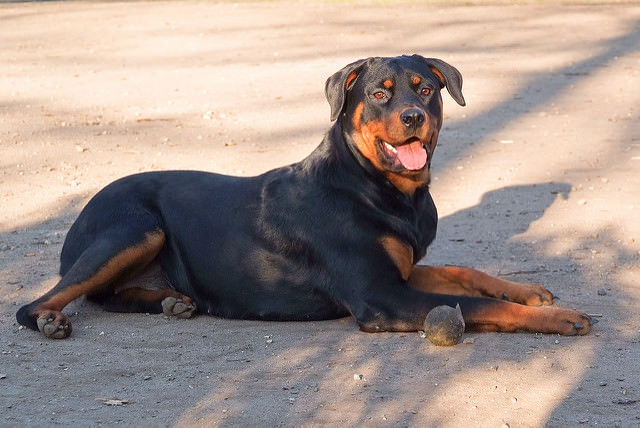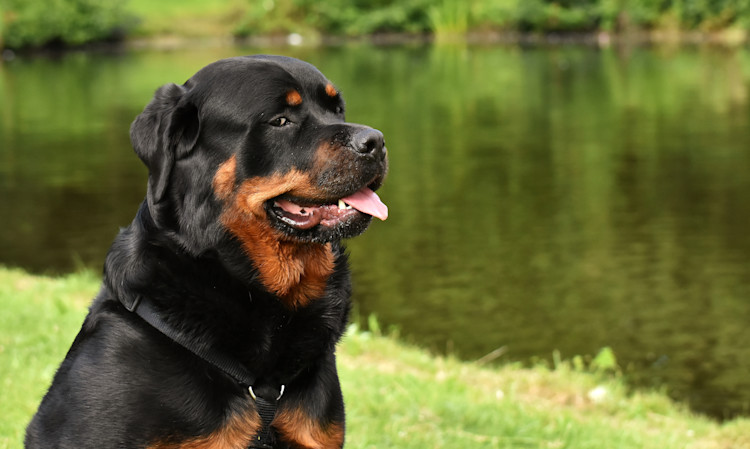Are you curious about how heavy a Rottweiler should be? Well, let’s dive right in and find out! When it comes to the ideal weight for a Rottweiler, there are a few factors to consider.
Firstly, the breed standard recommends that male Rottweilers weigh between 95 to 135 pounds, while females typically range from 80 to 100 pounds. However, it’s essential to note that every dog is unique, and some may fall slightly outside of these guidelines.
The weight of a Rottweiler is influenced by factors such as genetics, diet, exercise, and overall health. So, it’s crucial to work closely with a veterinarian to monitor your Rottie’s weight and ensure they maintain a healthy and balanced physique. It’s time to help your furry friend be the best version of themselves!

How Heavy Should a Rottweiler Be? A Guide to Proper Rottweiler Weight
Rottweilers are a robust and muscular breed known for their strength and loyalty. However, when it comes to their weight, it’s crucial to strike the right balance. In this article, we will delve into the topic of how heavy a Rottweiler should be and provide you with all the information you need to ensure your furry friend stays happy and healthy.
1. Understanding the Ideal Weight Range for Rottweilers
Rottweilers are a large breed, and maintaining a healthy weight is important to prevent any potential health issues. For male Rottweilers, the ideal weight range is typically between 95 to 135 pounds (43 to 61 kilograms), while female Rottweilers generally weigh between 80 to 100 pounds (36 to 45 kilograms). These ranges may vary slightly depending on the individual dog’s build, genetics, and activity level.
It’s essential to keep in mind that a Rottweiler’s weight should be proportional to its height. Obesity or being underweight can lead to various health problems. Regular check-ups with a veterinarian can help you determine if your Rottweiler falls within the ideal weight range for its size.
2. Factors Affecting Rottweiler Weight
Several factors can influence a Rottweiler’s weight, and understanding them will help you better manage your dog’s health. Genetics plays a significant role, as some bloodlines may have naturally heavier or lighter Rottweilers. Additionally, gender and age also impact a dog’s weight.
Diet and exercise are critical factors that can affect a Rottweiler’s weight. Feeding your Rottweiler a balanced diet that provides the necessary nutrients in appropriate portions is crucial. Consult with your veterinarian to determine the right type and amount of food for your dog based on their age, activity level, and overall health.
Regular exercise is equally important. Rottweilers are an active breed and thrive when provided with opportunities for physical activity. Engaging them in daily walks, playtime, or even structured exercises like obedience training can help maintain their weight and keep them mentally stimulated.
3. The Importance of Maintaining a Healthy Weight
Maintaining a healthy weight is essential for the overall wellbeing of your Rottweiler. Excessive weight gain can put strain on their joints and increase the risk of developing musculoskeletal issues, such as hip dysplasia and arthritis. It can also lead to respiratory problems and cardiovascular diseases.
Conversely, being underweight can indicate underlying health issues or malnutrition. A low body weight can weaken the immune system, making your Rottweiler more susceptible to infections and illnesses.
To ensure your Rottweiler stays at a healthy weight, monitor their food intake, provide regular exercise, and consult with your veterinarian whenever necessary. By doing so, you’ll be able to enjoy many years of companionship with your Rottweiler while keeping them happy and thriving.
Factors to Consider When Determining the Ideal Rottweiler Weight
After understanding the ideal weight range for Rottweilers, there are a few additional factors to consider when determining the specific weight for your dog.
1. Frame Size and Build
Just like humans, Rottweilers come in different sizes and builds. Some may have a larger frame and naturally carry more weight, while others may have a smaller frame and be leaner. It’s important to consider your Rottweiler’s individual body structure when determining their ideal weight.
2. Age and Life Stage
Rottweiler puppies grow rapidly during their first year and need proper nutrition to support their development. However, it’s crucial not to overfeed them to avoid excessive weight gain, which can strain their developing joints. As Rottweilers transition into adulthood, their nutritional needs may change, and adjusting their diet accordingly is essential.
When Rottweilers reach their senior years, they may become less active and have a slower metabolism. It’s important to monitor their weight and make any necessary adjustments to their diet and exercise routine to prevent obesity and maintain their overall health.
3. Activity Level
The activity level of your Rottweiler will also influence their weight. Dogs with a higher activity level will naturally burn more calories and may require a slightly higher calorie intake to maintain their weight. On the other hand, sedentary or less active Rottweilers may need fewer calories to avoid weight gain.
Finding a balance between diet and exercise is key. Consult with your veterinarian to determine the appropriate calorie intake for your Rottweiler based on their activity level and monitor their weight regularly to make any necessary adjustments.
Rottweiler Weight and Health Concerns
Maintaining a healthy weight not only contributes to your Rottweiler’s overall wellbeing but also helps prevent certain health concerns that can arise from being under or overweight.
1. Joint and Bone Issues
Excessive weight gain places additional stress on a Rottweiler’s joints and can lead to joint problems such as hip or elbow dysplasia. These conditions can cause chronic pain and mobility issues for your dog. On the other hand, being underweight can result in weakened bones, making fractures and injuries more likely.
2. Heart and Respiratory Problems
Obesity increases the risk of heart disease and puts strain on a Rottweiler’s cardiovascular system. It can also lead to respiratory difficulties, specifically in brachycephalic Rottweilers with shorter, compressed airways. Maintaining a healthy weight helps reduce these risks and keeps your Rottweiler’s heart and lungs functioning optimally.
3. Lifespan and Quality of Life
Maintaining a healthy weight has a direct impact on a Rottweiler’s lifespan and quality of life. Overweight or obese Rottweilers are more likely to have a shorter lifespan and experience a decreased quality of life due to the potential health issues they may face. Conversely, a healthy weight promotes longevity and ensures your Rottweiler can enjoy an active and happy life.
In conclusion, understanding and maintaining the proper weight for your Rottweiler is crucial for their overall health and wellbeing. By considering factors such as their frame size, age, and activity level, you can ensure they stay within the ideal weight range. Regular check-ups with your veterinarian and providing a balanced diet along with regular exercise will help you keep your Rottweiler happy and healthy for years to come.
Key Takeaways: How Heavy Should a Rottweiler Be?
- A healthy adult male Rottweiler typically weighs between 95 to 135 pounds.
- A healthy adult female Rottweiler usually weighs between 80 to 100 pounds.
- Keep in mind that individual Rottweilers may fall outside of these weight ranges.
- The weight of a Rottweiler can vary based on factors such as genetics, diet, and exercise.
- It’s important to consult with a veterinarian to ensure your Rottweiler maintains a healthy weight.
Frequently Asked Questions
In this section, we will address some commonly asked questions about the weight of Rottweilers. Understanding the appropriate weight range for your Rottweiler is essential for their overall health and well-being.
1. How much should a Rottweiler weigh?
The ideal weight for a male Rottweiler is between 95-135 pounds (43-61 kilograms), while for females, it is between 80-100 pounds (36-45 kilograms). However, it’s important to note that each Rottweiler is unique, and there can be variations within these ranges due to factors such as genetics, bone structure, and overall body composition.
Regular monitoring of your Rottweiler’s weight is crucial to ensure they maintain a healthy and balanced physique. Consulting with your veterinarian will help determine whether your Rottweiler falls within the appropriate weight range based on their specific age, size, and overall health.
2. What happens if a Rottweiler becomes overweight?
When a Rottweiler becomes overweight, it can have adverse effects on their overall health and quality of life. Excess weight puts added stress on their bones, joints, and organs, leading to an increased risk of developing conditions such as arthritis, hip dysplasia, and heart disease.
If you notice your Rottweiler is becoming overweight, it’s important to take immediate action. Consult with your veterinarian to develop a proper diet and exercise plan tailored specifically for your dog. This may involve portion control, choosing a high-quality, balanced diet, and engaging in regular physical activity to help shed excess pounds and improve overall health.
3. How can I determine if my Rottweiler is underweight?
If you suspect your Rottweiler is underweight, it’s important to consult with your veterinarian for a proper assessment. However, there are a few signs you can look out for at home. These include visible ribs, a prominent backbone, excessive lethargy, and a decreased appetite.
Underweight Rottweilers may lack the necessary muscle mass and body fat to support their overall growth and development. Your veterinarian may recommend a tailored feeding plan, including a nutrient-dense diet high in protein and healthy fats, to help your Rottweiler reach a healthy weight.
4. Are there any health risks associated with an underweight Rottweiler?
Yes, there can be health risks associated with an underweight Rottweiler. Being underweight may indicate an underlying health issue such as parasites, digestive disorders, or inadequate nutrient absorption. It can also weaken the immune system, making them more susceptible to infections and diseases.
If your Rottweiler is underweight, it’s crucial to seek veterinary advice to identify and address the underlying cause. Your veterinarian will conduct a thorough examination, perform necessary tests, and recommend a tailored treatment plan to help your Rottweiler regain a healthy weight and improve their overall well-being.
5. How often should I weigh my Rottweiler?
Weighing your Rottweiler regularly is a good practice to monitor their weight and overall health. Generally, it’s recommended to weigh your Rottweiler every 1-2 months, especially during their growth phases. This allows you to track their progress and make any necessary adjustments to their diet and exercise routine.
Additionally, it’s important to monitor your Rottweiler’s body condition by assessing their physical appearance and feeling their ribs. This can help you identify early signs of weight gain or loss and take appropriate action to maintain their optimal weight range.

Summary
So, how heavy should a Rottweiler be? It’s important to consider their size, age, and overall health. While there is no one-size-fits-all answer, the average weight for a male Rottweiler is between 95 to 135 pounds, while females typically weigh between 80 to 100 pounds. It’s crucial to keep an eye on their weight to avoid health issues. Regular exercise, a balanced diet, and consulting with a veterinarian are key to ensuring your Rottweiler remains healthy and happy. Remember, every Rottweiler is unique, so it’s best to tailor their diet and exercise routine to their individual needs.
